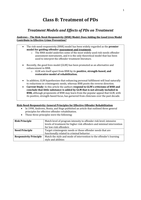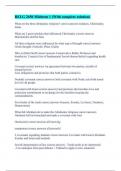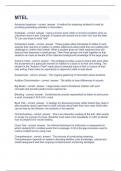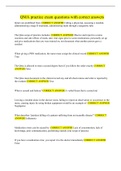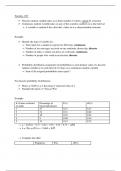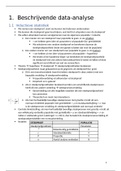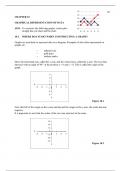Class 8: Treatment of PDs
Treatment Models and Effects of PDs on Treatment
Andrews – The Risk-Need-Responsivity (RNR) Model: Does Adding the Good Lives Model
Contribute to Effective Crime Prevention?
The risk-need-responsivity (RNR) model has been widely regarded as the premier
model for guiding offender assessment and treatment.
o The RNR model underlies some of the most widely used risk-needs offender
assessment instruments, and it is the only theoretical model that has been
used to interpret the offender treatment literature.
Recently, the good lives model (GLM) has been promoted as an alternative and
enhancement to RNR.
o GLM sets itself apart from RNR by its positive, strength-based, and
restorative model of rehabilitation.
In addition, GLM hypothesizes that enhancing personal fulfillment will lead naturally
to reductions in criminogenic needs, whereas RNR posits the reverse direction.
Current Study: In this article the authors respond to GLM’s criticisms of RNR and
conclude that little substance is added by GLM that is not already included in
RNR, although proponents of RNR may learn from the popular appeal that GLM, with
its positive, strength-based focus, has garnered from clinicians over the past decade.
Risk-Need-Responsivity: General Principles for Effective Offender Rehabilitation
In 1990, Andrews, Bonta, and Hoge published an article that outlined three general
principles for effective offender rehabilitation.
Those three principles were the following:
Risk Principle Match level of program intensity to offender risk level; intensive
levels of treatment for higher risk offenders and minimal intervention
for low-risk offenders
Need Principle Target criminogenic needs or those offender needs that are
functionally related to criminal behavior
Responsivity Principle Match the style and mode of intervention to the offender’s learning
style and abilities

